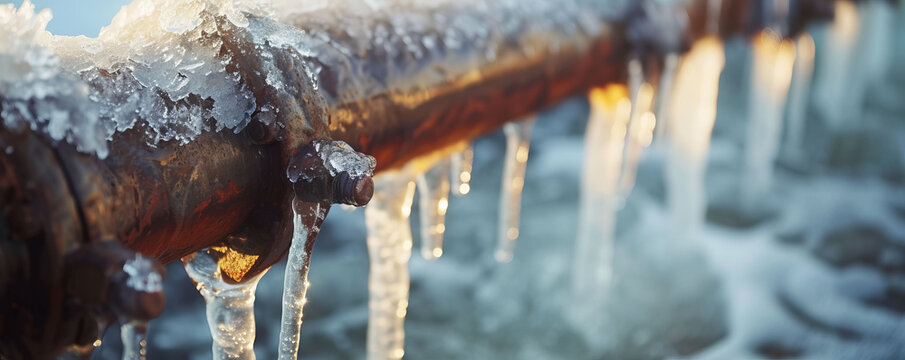Essential Strategies for Avoiding Frozen Plumbing in Cold Weather
Essential Strategies for Avoiding Frozen Plumbing in Cold Weather
Blog Article
The article author is making a number of good points relating to How To Avoid Freezing Pipes as a whole in this post down below.

Winter can damage your pipes, especially by freezing pipelines. Right here's how to avoid it from taking place and what to do if it does.
Introduction
As temperature levels decrease, the threat of frozen pipelines boosts, possibly resulting in expensive repair services and water damage. Comprehending how to stop frozen pipes is vital for home owners in chilly climates.
Avoidance Tips
Insulating prone pipes
Wrap pipelines in insulation sleeves or utilize warm tape to secure them from freezing temperature levels. Concentrate on pipes in unheated or exterior locations of the home.
Heating strategies
Keep interior spaces sufficiently heated, especially areas with pipes. Open up cupboard doors to permit cozy air to circulate around pipelines under sinks.
How to recognize frozen pipes
Seek reduced water circulation from faucets, uncommon odors or noises from pipelines, and visible frost on revealed pipes.
Long-Term Solutions
Architectural adjustments
Take into consideration rerouting pipes far from exterior walls or unheated areas. Include added insulation to attics, cellars, and crawl spaces.
Upgrading insulation
Purchase high-quality insulation for pipes, attics, and walls. Correct insulation helps maintain constant temperature levels and decreases the risk of icy pipelines.
Securing Exterior Pipes
Garden hose pipes and outside faucets
Disconnect and drain garden pipes before winter. Mount frost-proof faucets or cover exterior faucets with protected caps.
Understanding Frozen Pipes
What causes pipes to ice up?
Pipes ice up when subjected to temperatures below 32 ° F (0 ° C) for expanded periods. As water inside the pipelines freezes, it increases, putting pressure on the pipeline walls and potentially triggering them to break.
Risks and problems
Frozen pipes can bring about water interruptions, property damage, and pricey repairs. Burst pipelines can flood homes and cause extensive architectural damages.
Indicators of Frozen Pipeline
Determining icy pipelines early can stop them from bursting.
What to Do If Your Pipes Freeze
Immediate actions to take
If you suspect frozen pipes, maintain faucets open to relieve pressure as the ice thaws. Make use of a hairdryer or towels taken in hot water to thaw pipes slowly.
Final thought
Stopping frozen pipes requires aggressive actions and fast reactions. By comprehending the causes, signs, and safety nets, home owners can safeguard their pipes throughout winter.
Helpful Tips to Prevent Frozen Pipes this Winter
UNDERSTANDING THE BASICS: WHY PIPES FREEZE AND WHY IT’S A PROBLEM
Water freezing inside pipes is common during the winter months, but understanding why pipes freeze, and the potential problems it can cause is crucial in preventing such incidents. This section will delve into the basics of why pipes freeze and the associated problems that may arise.
THE SCIENCE BEHIND FROZEN PIPES
When water reaches freezing temperatures, it undergoes a physical transformation and solidifies into ice. This expansion of water as it freezes is the primary reason pipes can burst. As the water inside the pipe freezes, it expands, creating immense pressure on the walls. If the pressure becomes too great, the pipe can crack or rupture, leading to leaks and water damage.
FACTORS THAT CONTRIBUTE TO PIPE FREEZING
Low Temperatures: Extremely cold weather, especially below freezing, increases the risk of pipes freezing. Uninsulated or Poorly Insulated Pipes: Pipes located in unheated areas, such as basements, crawl spaces, or attics, are more prone to freezing. Insufficient insulation or lack of insulation altogether exacerbates the problem. Exterior Wall Exposure: Pipes running along exterior walls are susceptible to freezing as they encounter colder temperatures outside. Lack of Heating or Temperature Regulation: Inadequate heating or inconsistent temperature control in your home can contribute to frozen pipes. PROBLEMS CAUSED BY FROZEN PIPES
- Pipe Bursting: As mentioned earlier, the expansion of water as it freezes can cause pipes to burst, resulting in significant water damage.
- Water Damage: When pipes burst, it can lead to flooding and water damage to your property, including walls, ceilings, flooring, and personal belongings.
- Structural Damage: Prolonged exposure to water from burst pipes can compromise the structural integrity of your home, leading to costly repairs.
- Mold and Mildew Growth: Excess moisture from water damage can create a favorable environment for mold and mildew growth, posing health risks to occupants.
- Disrupted Water Supply: Frozen pipes can also result in a complete or partial loss of water supply until the issue is resolved.
WHY CERTAIN PIPES ARE MORE PRONE TO FREEZING
- Location: Pipes located in unheated or poorly insulated areas, such as basements, crawl spaces, attics, or exterior walls, are at higher risk of freezing.
- Exterior Pipes: Outdoor pipes, such as those used for irrigation or exposed plumbing, are particularly vulnerable to freezing as they are directly exposed to the elements.
- Supply Lines: Pipes that carry water from the main water supply into your home, including the main water line, are critical to protect as freezing in these lines can affect your entire plumbing system.
- Underground Pipes: Pipes buried underground, such as those connected to sprinkler systems or outdoor faucets, can be susceptible to freezing if not properly insulated.
https://busybusy.com/blog/helpful-tips-to-prevent-frozen-pipes-this-winter/

As a keen person who reads on Preventing and dealing with frozen pipes, I thought sharing that excerpt was beneficial. Do you know about somebody else who is in the market for the topic? Do not hesitate to promote it. Thank you so much for going through it.
Services Report this page